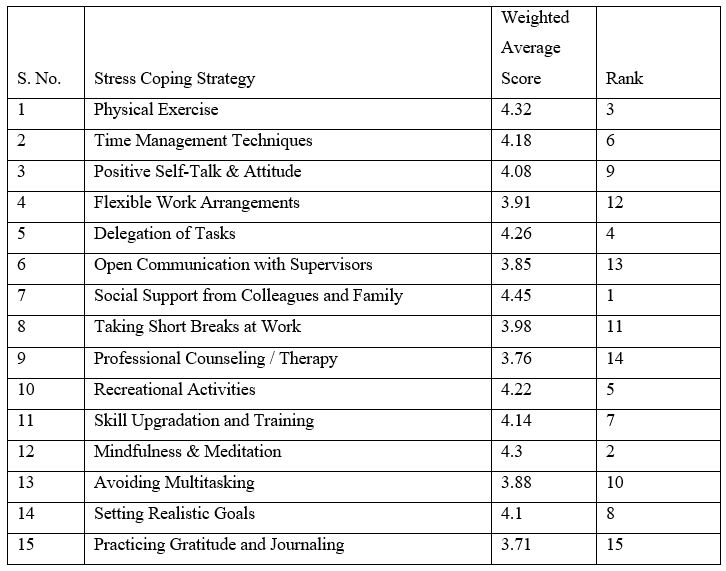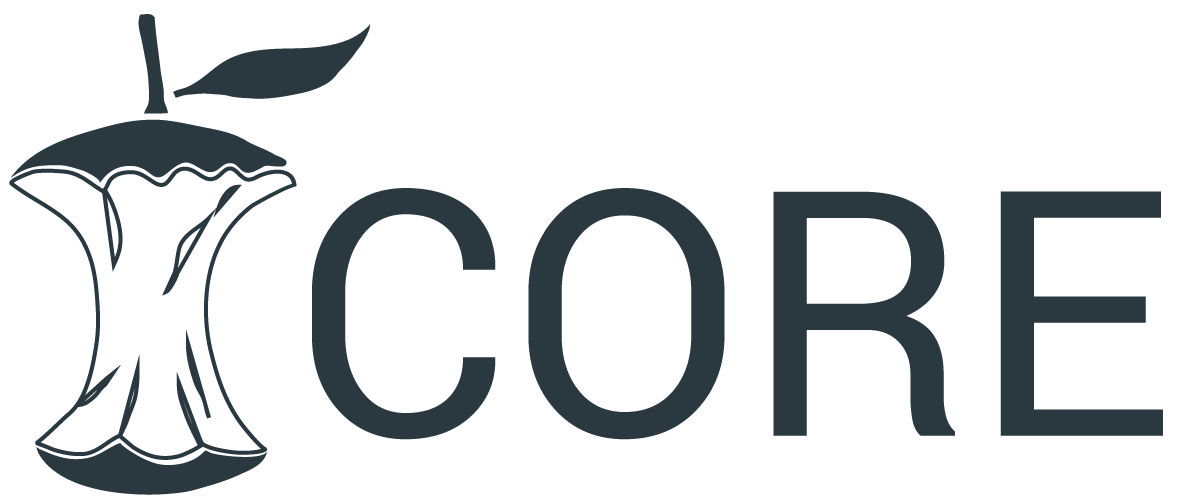Stress Coping Strategies Adopted by Selected Banking Employees in Tamil Nadu
DOI:
https://doi.org/10.5281/zenodo.15401152Keywords:
occupational stress, coping strategies, banking employees, tamil nadu, public and private sector banks, employee well-being, work-life balance, mental health, organizational support, hr policiesAbstract
Occupational stress has become an increasingly prevalent concern in the dynamic and demanding environment of the Indian banking sector. With the evolving roles of bank employees, fueled by technological advancements, regulatory changes, and increasing customer expectations, stress has emerged as a critical challenge affecting both individual well-being and institutional productivity. This study explores the various stress coping strategies adopted by selected banking employees across public and private sector banks in Tamil Nadu, aiming to understand how they navigate work-related pressures while maintaining their professional responsibilities. Using a mixed-method approach, primary data was collected from 800 banking professionals across key districts in Tamil Nadu through a structured questionnaire, supplemented by in-depth interviews. The study identifies and ranks fifteen core coping mechanisms, including time management, open communication, physical exercise, social support systems, mindfulness practices, and periodic skill enhancement. The findings reveal a clear variation in coping strategies based on organizational type, employee designation, age group, and work experience. Public sector employees tend to rely more on structured support systems and peer communication, whereas private sector employees show a higher inclination towards individual techniques such as digital detox and fitness routines.The study highlights the importance of institutional support in stress mitigation and recommends the integration of wellness programs, flexible scheduling, and stress management workshops into the HR policies of banks. Furthermore, it emphasizes that while individual resilience plays a crucial role, long-term solutions lie in creating a workplace culture that prioritizes mental well-being and work-life balance. The insights derived from this study offer valuable implications for banking institutions, policymakers, and human resource managers seeking to enhance employee satisfaction, reduce burnout, and ultimately, improve service delivery in the financial sector.
Downloads
References
Beehr, T. A., & Newman, J. E. (1978). Job stress, employee health, and organizational effectiveness: A facet analysis, model, and literature review. Personnel Psychology, 31(4), 665–699.
Deshmukh, N. H. (2009). Role stress and life satisfaction among working and non-working women. Journal of Health Management, 11(2), 243–256.
SurakshaKuldip, & Chhikara, S. (2017). Organizational climate factors affecting occupational stress among Indian bank employees: A CFA approach. International Journal of Management Studies, 4(2), 88–97.
Woods, D., Wall, T. D., & Hardy, G. E. (2003). The impact of psychological distress on absenteeism among bank employees. Journal of Occupational and Organizational Psychology, 76(3), 379–394.
Ayyappan, S., & Sakthivadivel, M. (2013). The impacts of occupational stress of selected banking sector employees in Tamil Nadu. International Journal of Finance & Banking Studies, 2(2), 100–108.
Rini Mercy, J., Vidhya, B., & Vishasini, M. (2024). A study on stress management of bank employees. Journal of Foundational Research, 31(2), 122–130.
Srinivasan, K., & Wilson, J. (2022). Effects of demographic factors on job stress level: Evidence from women bank employees in Tamil Nadu. European Journal of Social Sciences, 10(3), 947–960.
Uma Mageswari, S. (2014). A study on work stress among bank employees in Coimbatore district. International Journal of Computational Research and Development, 1(1), 135–140.
Ramanathan, N., & Mohan, S. C. (2014). A study of occupational stress among the public and private banks employees. International Journal of Indian Psychology, 2(1), 2147–2150.
Verma, V. L., & Bhadouriya, N. (2019). A study to assess the level of stress and coping strategies of employees among selected banks, Gwalior. International Journal of Advance Research, Ideas and Innovations in Technology, 5(3), 2099–2102.
Sam Renu, R., & Arumugasamy, G. (2013). Occupational stress among Pandyan Grama Bank employees in Virudhunagar district, Tamil Nadu, India. IOSR Journal of Business and Management, 8(4), 53–58.
Deva Kumar, S., Krishna Prakash, M., Jawahar, P., & Suseendar, C. (2022). A study on the impact level of stress among bank employees during the pandemic. Journal of Management Research, 14(2), 32–45
Lawrence Immanuel, S., & Xaviour Selvakumar, A. (2020). A study on job stress management among the employees of public and private sector banks. South Asian Journal of Marketing & Management Research, 10(1), 45–52.
Saravanan, K. (2019). A study on occupational stress among employees in public and private banking sector at Tiruchirappalli district. International Journal of Scientific Research and Review, 8(2), 123–130.
Amudha, R., Alamelu, R., Motha, L. C. S., & Badrinath, V. (2015). Manifestation of workplace stressors among banking personnel. International Journal of Management and Social Science Research Review, 1(12), 45–50.
Sakthivadivel, M., Krishnaraj, N., & Ramprakash, P. (2013). Utilization of big data in oil and gas industries using Hadoop MapReduce technology and HiveQL. Global Journal of Multidisciplinary and Applied Sciences, 1(2), 52–57.
Thiagarajan, S., Ayyappan, S., Ramachandran, A., & Sakthivadivel, M. (2011). An analysis of determinants of profitability in public and private sector banks in India. Research Journal of Social Science & Management, 1(6), 140–152.
Saranya, N., Sakthivadivel, M., Karthikeyan, G., & Rajkumar, R. (2023). Securing the cloud: An empirical study on best practices for ensuring data privacy and protection. International Journal of Engineering and Management Research, 13(2), 46–49.
Ayyappan, S., & Sakthivadivel, M. (2013). Financial efficacy of selected public and private sector banks in India. International Journal of Finance & Banking Studies, 2(2), 26–31.
Ayyappan, S., Sultana, M. S., & Sakthivadivel, M. (2014). Financial performance analysis of selected textile industries in India. International Journal of Engineering and Management Research, 4(3), 60–65.
Sakthivadivel, M., Priya, M. R., Krisnaraj, N., & Prabhakar, E. (2012). A novel artificial intelligent system for milk conservation using wireless sensor networks. Bonfring International Journal of Network Technology and Applications, 1, 7–13.
Ayyappan, S., & Sakthivadivel, M. (2013). Profitability analysis of selected public and private sector banks in India. Asian Journal of Managerial Science, 2(1), 44–47.
Ayyappan, S., Nagarajan, S., Sakthivadivel, M., & Prabhakaran, K. (2013). Empirical analysis of weak form efficiency: Evidence from National Stock Exchange of India Ltd. Beykent Üniversitesi Sosyal Bilimler Dergisi, 6(2), 85–90.
Ayyappan, S., & Sakthivadivel, M. M. (2012). Growth and trend analysis of key profitability factors in Indian scheduled commercial banks. Paripex - Indian Journal of Research, 1(9), 10–15.
Kahn, R. L., Wolfe, D. M., Quinn, R. P., Snoek, J. D., & Rosenthal, R. A. (1964). Organizational stress: Studies in role conflict and ambiguity. John Wiley & Sons.
Lazarus, R. S., & Folkman, S. (1984). Stress, appraisal, and coping. Springer Publishing Company.
Nguyen, Q. (2020). Occupational stress and job performance: A study of bank credit officers in Vietnam. Journal of Asian Finance, Economics and Business, 7(12), 961–969.
Rao, R., & Ramesh, K. (2010). Coping strategies among bank employees in South India. International Journal of Human Resource Management and Research, 2(2), 15–23.
Srivastava, A. K., & Singh, A. P. (1984). Manual of the occupational stress index. Varanasi: Banaras Hindu University.

Published
How to Cite
Issue
Section
License
Copyright (c) 2025 M Geethanjali, M Hajerabanu

This work is licensed under a Creative Commons Attribution 4.0 International License.
Research Articles in 'Management Journal for Advanced Research' are Open Access articles published under the Creative Commons CC BY License Creative Commons Attribution 4.0 International License http://creativecommons.org/licenses/by/4.0/. This license allows you to share – copy and redistribute the material in any medium or format. Adapt – remix, transform, and build upon the material for any purpose, even commercially.









